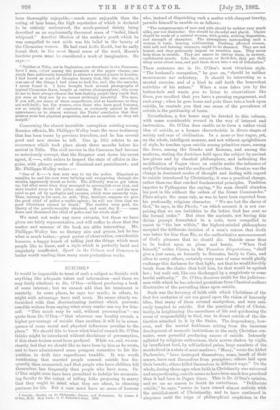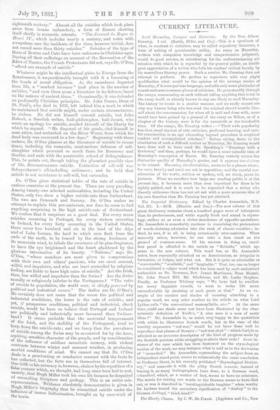S
IT would be impossible to treat of such a subject as Suicide with anything like adequate talent and information—and these we may fairly attribute to Dr. O'Dea—without producing a book of some interest; but we cannot add. that his treatment is masterly. In some places, he says too much ; in others, he might with advantage have said more. He seems utterly un- tarnished with that discriminating instinct which prevents sensible writers from saying what every reader can say for him- self. "This much may be said, without presumption"—we quote from Dr. O'Dea—" that wherever one locality reveals a higher per-centage of suicide than another, it will be in conse- quence of some moral and physical influences peculiar to the place." We should like to know what kind, of remark Dr. O'Dea thinks might be introduced without disclaimer of presumption, if this sheer truism must be so prefaced. While we .ead, we con- stantly feel that we should like to have been by him as he wrote, and to have administered some pungent corrective to his die. position to drift into superfluous twaddle, It was worth mentioning that married people commit suicide less fre- quently than unmarried, and that people who have children kill themselves less frequently than people who have none. Dr. O'Dea might even have been permitted to indulge his sermonis- ing faculty to the extent of telliug folks proposing to marry that they ought to mind what they are about, in choosing partners for life. But a man must have no sense of humour * Sude Studias on it, Phtiopopky, Canso, and Preuention, By Janes S. O'Dea, M.D. Now York: G. P. Putaittu's Sans. 1882.
who, instead of dispatching such a matter with sharpest brevity, permits himself to ramble on as follows :
"The temperaments of man and wife should be neither very much alike, nor too dissimilar. She should be cheerful and placid. Choice should be made of a natural woman, with gentle, retiring disposition, and strength of character. The atmosphere surrounding such a woman is tonic, bracing, exhilarating. Gushing, affected women, with soft and fawning manners, ought to be shunned. They are not honest, and they grievously impose on sensitive men. They never help them in trouble. They are snares to entrap them, in unwary, confidential moods. Like the octopus, or devil-fish, they put their slimy arms about men, and pull them down into a sea of tribulation.'
These sentences are in Dr, O'Dea's most vivacious style.
"The husband's occupation," he goes on, "should be neither monotonous nor sedentary. It should be interesting as a mental exercise, and of a kind, to call forth the benevolent activities of his nature." When a man takes you by the button-hole and wants you to listeu to observations like these, you recollect that you have a pressing engagement, and rush away ; when he goes home and puts them into a book upon suicide, he reminds you that one cause of the prevalence of suicide is the pertinacity of bores.
Nevertheless, a few hours may be devoted to this volume, with some considerable reward in the way of interest and instruction. Dr. O'Dea does enable us to form a rather vivid idea of suicide, as a human characteristic in divers stages of society and eras of civilisation. In a more or less vague, yet, on the whole, intelligent manner, and not without sprightliness of style, he touches upon suicide among primitive races, among the Jews, among the Greeks and Romans, and among the moderns, stating the doctrines held upon the subject by ancient law-givers and by classical philosophers, and indicating the modification of Pagan views on suicide under the influence of early Christianity and the mediaaval Churches. Great as was the change in dominant modes of thought and feeling with regard to suicide introduced by Christianity, it was a practical change, rather than one that reached fundamental principles. Tradition imputes to Pythagoras the saying, "No man should abandon his post in life without the orders of the Great Commander."
Plato adopts the same rule, as was to have been expected from
his profoundly religious character, "We are but the slaves of God," he says, in the Phcedo, "on which account it is not sur- prising that we are forbidden to die before God has sent un the formal order," But since the ancients, not having this divine precept formulated in a code, were compelled to resort to "the law within," the highest-minded philosophers
accepted the deliberate decision of a man's reason that death was better for him than llfe, as the authoritative announcement of God's pleasure that he should die, Suicide came thus to be looked upon as pious and heroic. "When God
himself," writes Cicero, in the Tusculaa Disputations, "shall give a just cause, as formerly to Socrates, lately to Cato, and often to many others, certainly every man of sense would gladly
exchange this darkness for that light; not that he would forcibly break from the chains that held him, for that would be against law ; but walk out, like one discharged by a magistrate or some lawful authority." Dr. O'Dea deserves credit for the judicious- ness with which he has selected quotations from Classical authors illustrative of the prevailing ideas upon suicide.
Such was the fervency of faith with which Christians of the first few centuries of our era gazed upon the vision of heavenly bliss, that many of them coveted martyrdom, and were seri-
ously tempted to suicide. But the practical effect of Christ- ianity, in heightening the sacredness of life and quickening the sense of responsibility to God, was to divest suicide of the dis- tinction attached to it by the Stoics. The despondency, how- ever, and the mental feebleness arising from the immense development of monastic institutions in the early Christian cen- turies, were powerful producing causes of suicide. Intensely agitated by religious enthusiasm, their nerves shaken by vigils, by insufficient food, by self-inflicted pains, large numbers of the monkslived in a state of semi-madness. "Many," wrote the Abbot
Pachomius, "have destroyed themselves ; some, bereft of their senses, have cast themselves from precipices ; others laid open
their bowels; others killed themselves in different ways." On the whole, during those ages when faith in Christianity was universal and unquestioning, suicide seems to have been much less practised than it had been in Pagan times. This is Dr. O'Dea's opinion, and. we see no reason to doubt its correctness. "Deliberate
suicide," he says, "seems to have ceased almost entirely with the establishment of Christianity, and to have continued in
abeyance until the reign of philosophical scepticism in the eighteenth century." Almost all the suicides which took place arose from insane melancholy, a form of disease showing itself chiefly in monastic retreats. "The Journal du Rogue de Henri IV., which includes nearly a century, and notes with scrupulous care the incidents of the time, however trivial, does not record more than thirty suicides." Suicides of the type of those of Brutus and Cato have been unknown in Christian ages. During all their sufferings on account of the Revocation of the Edict of Nantes, the French Protestants did not, says Dr. O'Dea, "afford one example of suicide."
Whatever might be the intellectual gains to Europe from the Renaissance, it unquestionably brought with it a loosening of the bonds of moral obligation. As the sacredness departed from life, a "marked increase" took place in the number of suicides, "and soon there arose a literature in its defence, based on the notions of ancient times." Occasionally, it was defended on professedly Christian principles. Dr. John Donne, Dean of St. Paul's, who died in 1631, left behind him a work in which he maintained that suicide might, under certain circumstances, be sinless. He did not himself commit suicide, but John Robeck, a Swedish writer, half-philosopher, half-Jesuit, who wrote an apology for suicide, availed himself of the liberty for which he argued. "He disposed of his goods, clad himself in neat attire, and embarked on the River Weser, from which his sdead body was recovered in a few days." Beginning with these writers, Dr. O'Dea glances at the literature of suicide in recent times, including the romantic, semi-serious defences of self. slaughter which procured so much fame for Rousseau and .Goethe, and ends with the pessimistic school of Schopenhauer. This, he points out, though taking the gloomiest possible view of life, discountenances suicide. Extinction of self-will was Schopenhauer's all-includiug ordinance ; and he held that suicide is not resistance to self-will, but surrender.
Dr. O'Dea gives statistical tables of the rate of suicide in various countries at the present day. These are very puzzling. Among twenty-one selected nationalities, including the United States, only two show a higher suicide-rate than Switzerland. The two are Denmark and Saxony. Dr. O'Dea makes no ,attempt to explain this pre-eminence, nor does he seem to find anything surprising in the high suicide-rate of Switzerland. We confess that it surprises us a good deal. For every seven Suicides occurring in Portugal, for every sixteen occurring in Ireland, for every forty occurring in the United States, there occur two hundred and six in the land of the Alps and of Lake Leman, the land to which men. flock from the ends of the earth, to be braced by the strong freshness of its mountain wind, to inhale the sweetness of its pine-fragrance, to have the eye brightened and the heart gladdened by the glorious intoxication of its beauty. "Nations," says Dr. O'Dea, "whose members are most given to compromises with their own and others' passions, who are most sensual, wilful, and impulsive, and who are least controlled by religious feeling, are liable to have high rates of suicide." Are the Irish, then, less wilful and impulsive than the Swiss P Are the .Swiss morally or religiously inferior to the Portuguese P "The ratio of suicide to population, the world over, is chiefly governed by political and imelfuetrial causes." The italics are Dr. O'Dea's. He certainly does not mean that the worse the political and industrial conditions, the lower is the rate of suicide; and yet, if prosperous conditions, political and industrial, check suicide, would he have us believe that Portugal and Ireland are politically and industrially more favoured than Switzer- land ? It seems probable that the mercurial temperament of the Irish, and the stolidity of the Portuguese, tend to keep down the suicide-rate; and we fancy that the prevalence of suicide among the Swiss may be accounted for by the keen, aspiring, sensitive character of the people, and by consideration of the influence of sublime mountain scenery, with violent contrasts between winter and summer weather, in producing morbid conditions of mind. We cauuot say that Dr. O'Dea deals in a penetrating or conclusive manner with the facts he has collected, but the facts are in themselves full of interest. Our faith in his accuracy is, however, shaken by his repetition of a false rumour which, we thought, had long since been laid to rest, namely, that Hugh Miller took his own life because he despaired of reconciling Scripture and. geology. This is an entire mis- representation. Evidence absolutely demonstrative is given in Hugh Miller's biography that he committed suicide under the
influence of insane hallucination, brought on by over-work of the brain.



































 Previous page
Previous page